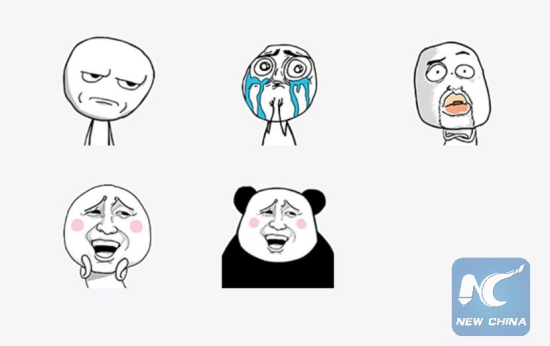
Samples of Baozou Comics stickers on WeChat app. (MOMO Ltd)
Traditionally, Chinese love to keep face. The Chinese face-loving culture has evolved into a new fad online that many young people indulge themselves in: facial expression stickers.
The fad of online stickers, or funny pictures with amusing facial expressions and witty words, has swept the country in friends' talk or even debate about political issues.
"I use stickers a lot," said Liu Yiran, a 23-year-old college student in Beijing, "They make us feel closer." She also collects from friends interesting ones on chatting app like WeChat.
Like Liu, Miao Kaixian, a 24-year-old Beijinger, also love hilarious facial expression stickers because it proves a funny way to break ice when he met new friends.
"Once started in a conversation, such stickers could come endlessly," Miao said.
Originally inspired by Rage Comic, online facial expression stickers among young Chinese have their own features, combining cuteness with parody.
A common way of making such stickers is to add amusing words to a picture, especially some exaggerated human faces or comics, to express certain feelings. With photo-editing software Photoshop, numerous stickers have been created by Chinese netizens.
For example, Yao Ming, the well-known basketball star, remains the most classic and popular source for stickers making. His twisted laughter was made into hundreds of different laughable stickers, of which the most common ones are those on a comic panda.
China's most widely used online messaging platform WeChat also helps spread the facial expression stickers as it's easier to find or send such stickers through WeChat than their foreign peers.
"I feel using stickers sets a leisurely playful tone to my WeChat conversations," said Kevin, an international student in Beijing. "They undoubtedly add personality and humor to conversation, but I generally don't like to spend a lot of time on my phone as I often have other things going on."
Though enjoyed by many, such stickers could be confusing and annoying, too.
"Sometimes when you open the group chats, boom! A full screen of weird stickers pop up," Miao said.
While those light-hearted stickers flooded China's cyberspace, some fear whether stickers will replace the written language or even threaten its purity.
But Han, a linguistics lecturer from the Capital Normal University, said such concerns might be overblown.
"In general, I don't think they will significantly affect how Chinese language is being used," she said, because stickers are only applied in instant messaging.
"We may, however, observe changes in how those susceptible to sub-culture recognize and process visual information in the long run. Say, changes in their short-term memory capacities due to disruptive, graphic insertions into written texts," she added.


















































